What’s the difference between superlative and comparatives? In English language education, superlatives and comparatives are adjectives used to compare two or more than two things. The challenge is to master when and how to use them in writing and daily language. In this guide, we’ll help you understand the difference between superlatives and comparatives and when or how to use each.
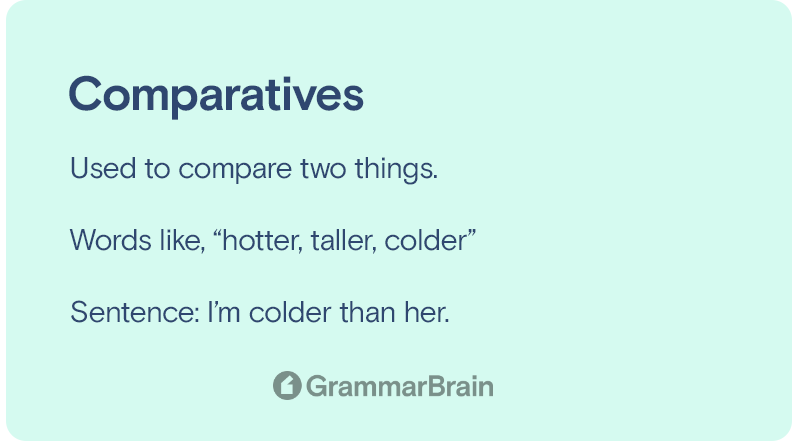
What’s a comparative?
The most basic grammar topic in English is learning to compare two things. Comparatives are simply adjectives used to make comparisons between two nouns.
Typically, in English, these are words with “er” at the end, but they can be more challenging than this. Consider words like “busier,” “uglier,” etc. Not all comparative forms end with “er.”
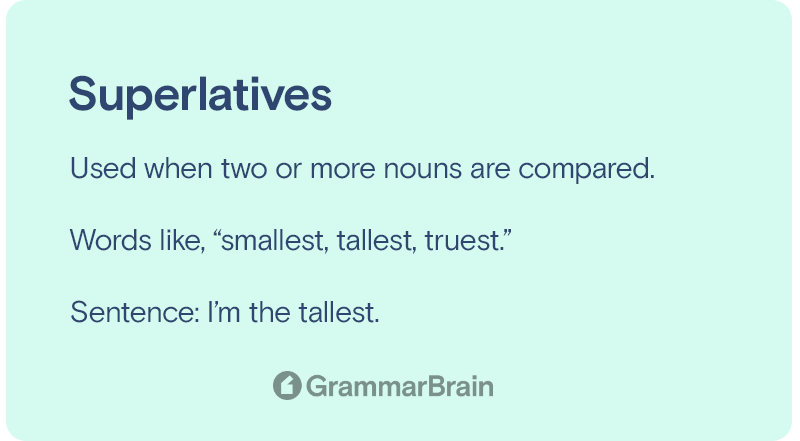
What’s a superlative?
While getting an English education, students often come across words to compare nouns to the lowest or highest degree.
When two or more nouns are compared by using such words, these words are superlatives.
Superlative words typically end in “est,” such as “biggest,” “thinnest,” and so on.
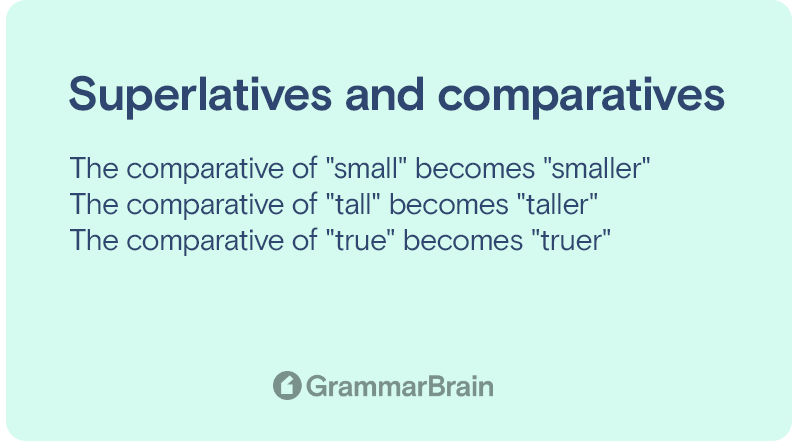
What’s the difference between superlative and comparative?
In learning about the degrees of comparison, English may seem tricky, but it is very simple. Adjectives occur in comparative and superlative forms.
The adjective’s comparative form primarily represents a comparison between two things – objects or subjects.
For instance:
- John is stronger than Jim.
Here, two people, John and Jim, are compared to each other.
While going through formative English education, the superlative adjective denotes a group’s highest or lowest degree of comparison.
For example:
- I hope the bravest side wins the battle.
Here, the highest degree gets attributed to a subject (the side).
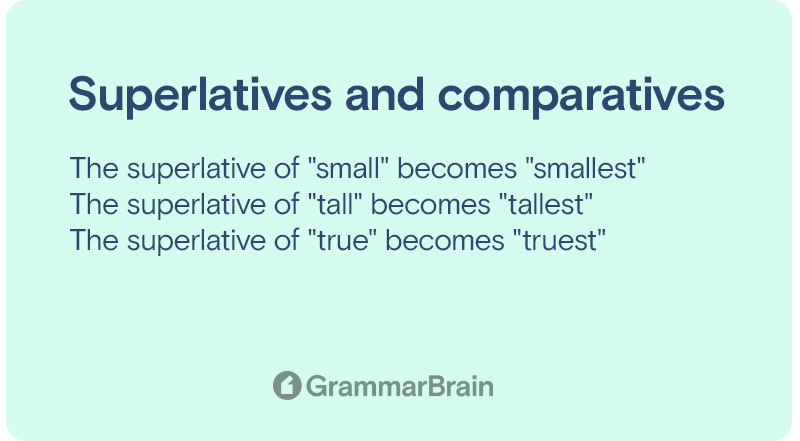
Forming Regular Comparatives and Superlatives
Anyone who has had a formal education will know about the comparative and superlative degrees of comparison but may not know these nuances. The formation of regular comparative and superlative adjectives occurs by adding “er” (for the comparative) and “est” (for the superlative) to the ends of words.
Here are some examples:
- The comparative of “small” becomes “smaller”
- The comparative of “tall” becomes “taller”
- The comparative of “true” becomes “truer”
The rules for the superlative are easy too:
- The superlative of “small” becomes “smallest”
- The superlative of “tall” becomes “tallest”
- The superlative of “true” becomes “truest”
Regular comparatives and superlatives are formed by adding “er” or “est” to make a word comparative or superlative, respectively.
Although, if this were the only way to form degrees of comparison, people wouldn’t get confused.
The way that comparatives and superlatives form themselves is based on how many syllables occur in the adjective.
Additionally, adjectives that end with “y” change to “ier”/”iest” at the end of the word.
Understanding One-syllable Adjectives
In the case of basic adjectives with a single syllable, the comparative forms simply by adding “er’ to the end of the word.
The superlative, as learning in English goes, is formed by adding “est” to the end of the word.
Word list (single-syllable adjectives)
Here is a list of basic adjectives with a single syllable with the comparative and superlative forms of each word:
- hot (adjective), hotter (comparative), hottest (superlative
- green (adjective), greener (comparative), greenest (superlative)
- tall (adjective), taller (comparative), tallest (superlative)
- cold (adjective), colder (comparative), coldest (superlative)
- slow (adjective), slower (comparative), slowest (superlative)
- dumb (adjective), dumber (comparative), dumbest (superlative)
- long (adjective), longer (comparative), longest (superlative)
- brief (adjective), briefer (comparative), briefest (superlative)
- bright (adjective), brighter (comparative), brightest (superlative)
- weak (adjective), weaker (comparative), weakest (superlative)
Sentence examples
Sentences like the following depict examples of the comparative adjective:
- Alaska is colder than New York.
- Our neighbors drive a faster car than ours.
- Linda is tall for her age, but Betty is taller than her.
- The sooner you come, the earlier we can leave.
- The less you eat, the weaker you will get.
- There is no other man that is stronger than him in this competition.
The following sentences are examples of the superlative adjectives:
- Mary is the tallest secretary in the office.
- The hottest month of the year is July.
- The saddest time of her life was when her grandmother passed on.
- The smallest things are often the best.
- That was the briefest spell of rain that we have had in months!
- My neighbor is the kindest woman on our street.
Understanding Two-syllable Adjectives
English has many examples of words composed of a range of syllables. In case adjectives have two syllables, the comparative forms by adding “er” to the conclusion of the word.
Additionally, in some adjectives of two syllables, the words “more” or “less” may precede the adjective.
Rules in English grammar state that, for adjectives with two syllables to be transformed into superlative adjectives, the ending “est” gets added.
The words “most” and “least” may precede some adjectives with two syllables.
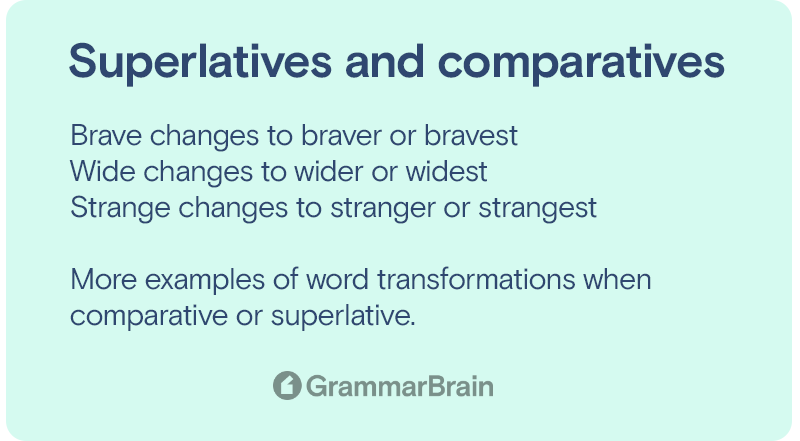
Word list (two-syllable adjectives)
Here are some common two-syllable adjectives and comparative and superlative forms of these:
- crazy (adjective), crazier (comparative), craziest (superlative)
- happy (adjective), happier (comparative), happiest (superlative)
- quiet (adjective), quieter (comparative), quietest (superlative)
- nervous (adjective), more/less nervous (comparative), most/least nervous (superlative)
- joyful (adjective), more/less joyful (comparative), most/least joyful (superlative)
- tasty (adjective), tastier (comparative), tastiest (superlative)
- costly (adjective), costlier (comparative), costliest (superlative)
- loving (adjective), more loving (comparative), most loving (superlative)
- busy (adjective), busier (comparative), busiest (superlative)
- empty (adjective), emptier (comparative), emptiest (superlative)
Sentence examples
Here are some sentences with comparative adjectives of two syllables:
- Tom tends to be less active than his brother John.
- This exam was simpler than the last exam.
- The woman was busier than her husband.
- New cars are more rapid than the older models.
- She is busier than the president!
- The road was emptier at night than it was in the daytime.
Here are some examples of sentences incorporating superlative adjectives with two syllables:
- King Henry appears to be the craziest king in history.
- The least rapid train leaves in five minutes.
- Tom was the happiest student in his class when he stood first.
- In this restaurant, you can find the tastiest dishes in Paris.
- Susan is the most joyful child in the school.
- She bought the costliest dress in the store.
Understanding Irregular Adjectives (and comparatives and superlatives)
When learning about the degrees of comparison in education, it is important to be aware of a few irregular comparative and superlative adjectives. These are “irregular” as they don’t adhere to the rules of forming the comparative and superlative, as mentioned earlier.
Irregular comparative and superlative adjectives are below:
- Good (adjective), better (comparative), best (superlative)
- Ill/bad (adjective), worse (comparative), worst (superlative)
- Far (adjective for distant), farther (comparative), farthest (superlative)
- Little (adjective for amount), less (comparative), least (superlative)
- Far (adjective for extent), further (comparative), furthest (superlative)
- Well (adjective), better (comparative), best (superlative)
- Many/much (adjective), more (comparative), most (superlative)
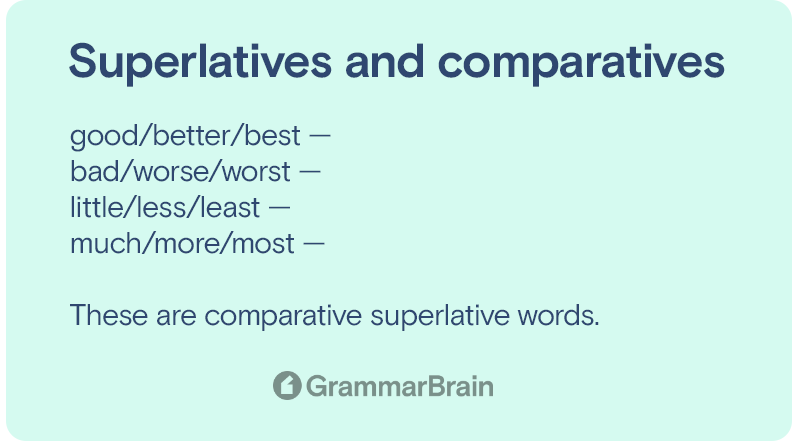
How to Identify Comparative and Superlative Adjectives
Comparative and superlative adjectives are not hard to identify in speech and language.
There is always some confusion that occurs when thinking about these two forms. The following hints may help to know when these adjectives are referred to clearly.
They are as follows:
Tip #1
Remember the spelling rules before turning an adjective into its comparative or superlative form. In case the ending of an adjective has to be changed, how the adjective is commonly spelled needs to be considered.
If the word ends with an “e” (as a regular adjective), only “r” must be added to the end of the word for the comparative. In the same way, if a regular adjective ends with “e,” only “st” goes at the end of the word.
Look at the examples below:
- Brave changes to braver or bravest
- Wide changes to wider or widest
- Strange changes to stranger or strangest
- Bare changes to barer or barest
- Blue changes to bluer or bluest
- Eerie changes to eerier or eeriest
Tip #2
Rearrange the sentence for using different adjective forms. Different forms of the word/adjective can be used if sentences are “adjusted” to match adjectives.
Look at the following examples with adjectives having a single syllable:
- For example, for the comparative – Bill ran faster than Jane.
On rearranging the sentence in a way that permits the use of the superlative, note the following:
- Between Bill and Jane, Bill ran the fastest.
Here, a comparison occurs between Bill and Jane, the two people in the sentence. It should be noted that the word “the” used in the above superlative sentence indicates how superlative adjectives may function.
- Example for the Superlative – She was the shortest girl in her class.
It is possible to rearrange the sentence above to use the comparative adjective and still retain the meaning:
- She was shorter than any other girl in her class.
The comparison is still made here to other girls in the class, and a description to the lowest degree exists.
It’s also important to notice a characteristic of the use of the comparative, and that is how “than” follows the adjective.
Superlative and Comparative Quiz for Kids
While imparting education, children learn better with games and quizzes that test their learning abilities. Here is a short quiz on superlative and comparative adjectives for kids:
Which adjectives display the highest degree in terms of quality?
Superlative Adjectives
Which are the adjectives that make use of the extra modifier “more”?
Comparative Adjectives
Say whether the following sentence makes use of a comparative or a superlative.
“I think that trifle pudding is a better dessert than chocolate cake. (It makes use of a Comparative)
Is the word in italics comparative or superlative?
The river near my house is the longest river in our county. (It is Superlative)
Out of the two sentences below, which uses a comparative adjective?
a. The new girl is the cleverest in the class.
b. This is a tastier dish than the one we ate yesterday. (This sentence makes use of a comparative adjective)
Conclusion
The degrees of comparison are used extensively in the English language and form a significant part of the ability of people to communicate effectively.
While people get used to the rules of speech and language, practicing these in daily speech is crucial to developing clear communication and writing.
FAQs
What are superlatives and comparatives?
These are adjectives used in the English language to make comparisons. The comparative adjective compares two objects or subjects. The superlative adjective compares more than two subjects or objects.
How are the comparative and superlative adjectives formed?
The comparative adjective is formed by adding “er” to the adjective end. For forming the superlative, “est” must be placed at the end of a word. If the adjective has the ending with a letter “e,” only “-er” or “-st” is added at the end of the word.
Give an example of a superlative adjective in a sentence.
The tallest building nearly seemed as if it was touching the sky.
What is an example of a comparative sentence?
Jamie is younger than Mary by three years.
How should one explain comparatives and superlatives to a child?
Comparatives are formed to compare things, while superlatives are used to say which are the best things in a group.
How is the superlative adjective formed?
Noun (subject) + verb + the + superlative adjective + noun (object)
When do I add an “er” to the word?
Add -er for the comparative and -est for the superlative.
If the adjective has a consonant + single vowel + consonant spelling, thefinal consonant must get doubled before adding the ending.
What are examples of adjective comparative superlative words?
Good/better/best — bad/worse/worst — little/less/least — much/more/most
More resources:
- Comparatives and Superlatives: Definition, Examples, & Exercises | Albert.io
- Comparative and superlative adjectives | LearnEnglish (britishcouncil.org)
- Comparative and Superlative Adjectives: Rules | Grammarly Blog
- How Do You Modify an Adjective? | Merriam-Webster
- The Comparative and the Superlative – Wall Street English
- Comparative vs. Superlative Adjectives | Thesaurus.com
Inside this article
Fact checked:
Content is rigorously reviewed by a team of qualified and experienced fact checkers. Fact checkers review articles for factual accuracy, relevance, and timeliness. Learn more.
Core lessons
Glossary
- Abstract Noun
- Accusative Case
- Anecdote
- Antonym
- Active Sentence
- Adverb
- Adjective
- Allegory
- Alliteration
- Adjective Clause
- Adjective Phrase
- Ampersand
- Anastrophe
- Adverbial Clause
- Appositive Phrase
- Clause
- Compound Adjective
- Complex Sentence
- Compound Words
- Compound Predicate
- Common Noun
- Comparative Adjective
- Comparative and Superlative
- Compound Noun
- Compound Subject
- Compound Sentence
- Copular Verb
- Collective Noun
- Colloquialism
- Conciseness
- Consonance
- Conditional
- Concrete Noun
- Conjunction
- Conjugation
- Conditional Sentence
- Comma Splice
- Correlative Conjunction
- Coordinating Conjunction
- Coordinate Adjective
- Cumulative Adjective
- Dative Case
- Determiner
- Declarative Sentence
- Declarative Statement
- Direct Object Pronoun
- Direct Object
- Diction
- Diphthong
- Dangling Modifier
- Demonstrative Pronoun
- Demonstrative Adjective
- Direct Characterization
- Definite Article
- Doublespeak
- False Dilemma Fallacy
- Future Perfect Progressive
- Future Simple
- Future Perfect Continuous
- Future Perfect
- First Conditional
- Irregular Adjective
- Irregular Verb
- Imperative Sentence
- Indefinite Article
- Intransitive Verb
- Introductory Phrase
- Indefinite Pronoun
- Indirect Characterization
- Interrogative Sentence
- Intensive Pronoun
- Inanimate Object
- Indefinite Tense
- Infinitive Phrase
- Interjection
- Intensifier
- Infinitive
- Indicative Mood
- Participle
- Parallelism
- Prepositional Phrase
- Past Simple Tense
- Past Continuous Tense
- Past Perfect Tense
- Past Progressive Tense
- Present Simple Tense
- Present Perfect Tense
- Personal Pronoun
- Personification
- Persuasive Writing
- Parallel Structure
- Phrasal Verb
- Predicate Adjective
- Predicate Nominative
- Phonetic Language
- Plural Noun
- Punctuation
- Punctuation Marks
- Preposition
- Preposition of Place
- Parts of Speech
- Possessive Adjective
- Possessive Determiner
- Possessive Case
- Possessive Noun
- Proper Adjective
- Proper Noun
- Present Participle
- Prefix
- Predicate



